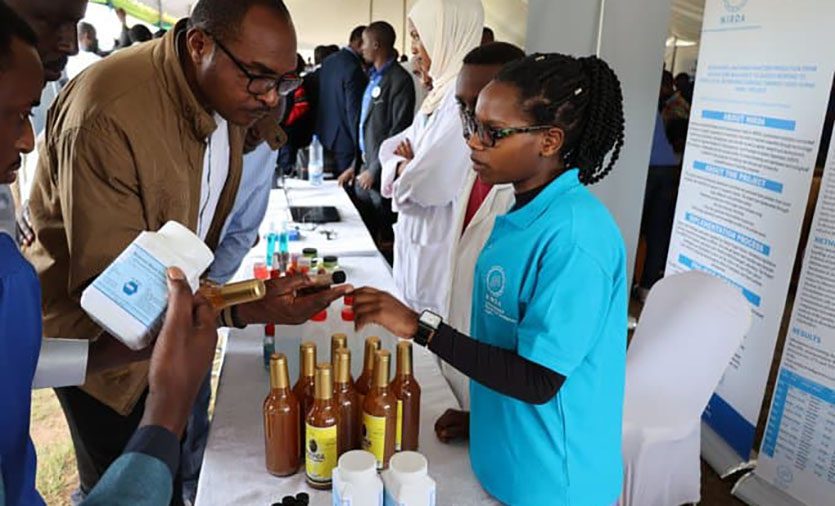SGCI News
[KIGALI] For years, Augusti Ntivuguruzwa struggled to perfect his banana wine in Rwanda. As for many traditional wine-makers in the country, each batch brought uncertainty about whether regulators would approve…
- Rwanda banana wine-makers struggle with regulatory approval of yeasts
- Researchers obtain patent for locally sourced banana wine starter culture
- It promises to be cheaper than imported alternatives for Rwanda’s producers
[KIGALI] For years, Augusti Ntivuguruzwa struggled to perfect his banana wine in Rwanda.
As for many traditional wine-makers in the country, each batch brought uncertainty about whether regulators would approve his product.
“Before now, we did not have any yeast specifically made for banana wine and it has been difficult for regulators to approve of the banana wine we produce,” says Ntivuguruzwa.
“Passing regulators with banana wine is a very complex process. They always have something to say about the wine.”
His challenge reflects a broader struggle in Rwanda’s growing banana wine industry, where many producers end up using inappropriate ingredients for fermentation, compromising both quality and regulatory compliance.
In Rwanda, banana wine, popularly called Urwagwa, is a traditional drink with an expanding market.
The wine is made by smoking ripe bananas to increase the sugar content and then mashing them and mixing with water to create juice. The yeast is then added for fermentation and the mixture strained to produce the wine.
Although bananas are widely cultivated and the demand for banana wine is increasing, producers like Ntivuguruzwa have faced the persistent challenge of sourcing appropriate yeast for production.
Neither the yeast used in baking, nor that used in winemaking is the right fit for banana wine, says Emmanuel Nsabimana, a food chemist at Urwibutso Enterprise, a food and drinks company.
“Bakery yeast is far from being the right fermenting agent for banana wine while wine yeast is made for fermenting grape wine,” he explains.
“It’s technically not right to use any of them for fermenting banana wine.”
Authentic wine
The problem prompted researcher Emmanuel Munezero and his team to explore local raw materials that could be used as starter cultures — microorganisms that aid fermentation and extend the shelf life of food and drinks.

“We now have the first starter culture for which the Rwanda Development Board approved the patent in December 2024,” says Munezero, lead researcher and product and technology development specialist at the Rwanda National Industrial Research and Development Agency.
He says this breakthrough came from looking at various local banana brews.
“We then isolated elements that make fermenting possible,” Munezero explains.
“Three elements proved best for making starter culture, looking at their capacity to turn banana sugar into wine and resistance to dilution.”
The team looked for a fermenting agent that could remain reactive in substances with a temperature of up to 37 degrees Celsius* and alcohol of the recommended 16 per cent per volume.
They also wanted to ensure that the new yeast would preserve the traditional qualities of banana wine.
“We mixed the fermenting agent with sorghum flour to keep the traditional colour and aroma of sorghum, the traditional fermenting agent of banana wine,” says Munezero.
The resulting yeast can remain dormant for over a year and can be reactivated using low temperatures, added Munezero.
Fit for market
Since receiving funding from the Science Granting Councils Initiative (SGCI) in 2023, scientists have put the yeast through extensive testing.
Now, Munezero and his team plan to commercialise the starter culture within six months and are working on developing it in powder form to match other commercial yeasts.
Although unclear about the exact cost, Munezero is confident that the yeast will be affordable for banana wine-makers like Ntivuguruzwa.
“There is no doubt it will be cheaper than other yeasts,” says Munezero.
“Everything is from the traditional raw materials available in the country. Nothing is imported.”
This article was written by Kelly Rwamapera.
Related News
Voices of SGCI: Council leaders on the direction and ambition of SGCI 3
At the African Union’s Science, Technology and Innovation Week in Addis Ababa, earlier this month, leaders of science granting councils reflected on what SGCI Phase 3 represents for Africa’s science and innovation systems. From ownership and alignment to stewardship and sustainability, here are their voices…
Building Africa’s science future: inside the SGCI alliance
As Phase 3 of the Science Granting Councils Initiative launches on the margins of the African Union Summit in Addis Ababa last week, the SGCI Alliance Chair explains why this moment marks a decisive turning point for African science. Cephas Adjei Mensah describes what is…
Open call: Support for science granting councils in Sub-Saharan Africa
The International Development Research Centre (IDRC), through the Science Granting Councils Initiative (SGCI), has launched a call for proposals to support science granting councils in Sub-Saharan Africa in the establishment and operationalisation of the Capacity Strengthening Hub under Phase III of the SGCI-3. The Hub…
SGCI funded projects
Rwanda’s integrated approach to sustainable agriculture and nutrition
Project Titles & Institution Areas of Research Number of Projects being funded Project Duration Grant Amount In-Kind Distribution Council Collaboration with other councils





